人称代词的主格在句子中作主语或表语
代词:人称代词用法归纳

代词:人称代词用法归纳英语中人称代词(Personal Pronoun)意为用于指代人的词汇,属于代词范畴,就像汉语中的“你”、“我”、“他”。
常用的英语人称代词有:I、you、he、she、it(主格)。
人称代词在句中作不同成分时有不同的形式,如:主格、宾格、第三人称单数形式等。
一、人称代词的主格和宾格人称代词有主格和宾格两种形式,第三人称的人称代词还有性别的变化。
主格主要用来做句子的主语,在正式文体中也可用作表语;宾格主要用作宾语,在口语中也常用来做句子的表语。
在口语中,若省略谓语及其他成分的短句中,人称代词宾格可用作主语。
如:“He has read the novel. ” “Me too. ” “他看过这小说”。
“我也看过”。
二、人称代词的排列顺序1. 两个或两个以上的人称代词并列使用时,对于单数人称代词,按“二三一”的顺序排列;对于复数人称代词,按“一二三”的顺序排列。
如:You, he and I must obey the rules. 你,他和我都得遵守规则。
We, you and they should stay here. 我们,你们和他们都应该留在这。
2. 若要承担责任或过失时,则通常将第一人称放在前面。
如:It was I and Tom who were late. 迟到的是我和汤姆。
3.表示男女的代词并排使用时,通常是先男后女。
如:Nobody likes such things except him and her. 除了他和她,没有喜欢那样的东西。
三、人称代词主格的用法主格人称代词通常在句子中做主语和表语。
1、作主语We live in a new era.我们生活在一个新时代。
I love my major.我热爱我的专业。
2、作表语It was you who told her the truth.将实情告诉她的是你。
It was she that helped us out.是她帮助我们走出困境的。
高三英语《代词 ,数词,冠词》
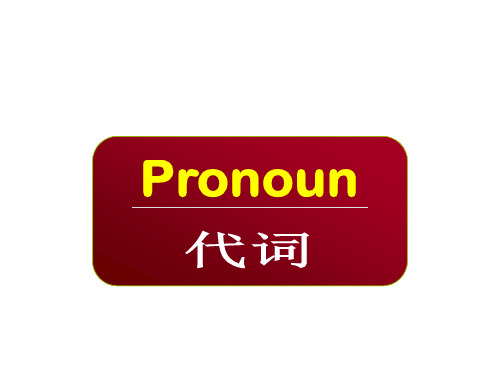
one,that 和 it
问题3: I prefer a flat in Inverness to ____ in Perth, A because I want to live near my Mom’s. A. one B. that C. it D. this 问题4: Cars do cause us some health problems — in fact far more serious than ___ caused by mobile D phones. A. one B. ones C. it D. those 问题5: Our dinner table is bigger than ____ of yours. C A. one B. it C. that D. this
问题1 Meeting my uncle after all these years was an unforgettable moment, ____ I will B always treasure. A. that B. one C. it D. What 问题2 The Parkers bought a new house but ___ B will need a lot of work before they can move in. A. they B. it C. one D. which
人称代词之主、宾格的替换 问题: — Susan, go and join your sister cleaning the yard. — Why ____ ? John is sitting there D doing nothing. A.him B.he C.I D.me
在简短对话中,当人称代词单独 使用或在not 后,多用宾格。 --- I like English. 我喜欢英语。 --- Me too. 我也喜欢。 --- Have more wine? 再来点酒喝吗? --- Not me. 我可不要了。
名词性物主代词和形容词性物主代词的用法

形容词性物主代词与名词性物主代词的用法一.人称代词的主格在句子中作主语1. I am sorry I am late.2. They/We are both from the south.3.She is clever than me.二.人称代词的宾格在句子中作动词宾语或介词宾语,表语。
1His mother told him to study hard.2Deming’s mother bought a new bike for him.3.Who is it ? It is me三.形容词性物主代词一般位于名词前,用作定语。
1My name is John Green.我叫约翰·格林。
2Excuse me, is this your car?对不起,这是您的车吗?3His parents are in England.他的父母在英国。
4They wash their faces every day.他们每天都洗脸。
四.名词性物主代词的句法功能a.作主语,例如:May I use your pen? Yours works better.我可以用一用你的钢笔吗?b.作宾语,例如:成都戴氏教育金堂分校I love my motherland as much as you love yours.我爱我的祖国就像你爱你的祖国一样深。
c.作介词宾语,例如:Your should interpret what I said in my sense of the word, not in yours.你应当按我所用的词义去解释我说的话,而不能按你自己的意义去解释。
d.作表语,例如:Is this your book or mine?e.名词性物主代词=形容词性物主代词+名词为避免重复使用名词,有时可用“名词性物主代词”来代替“形容词性物主代词+名词”的形式。
例:My bag is yellow, her bag is red, his bag is blue and your bag is pink.为避免重复使用bag,可写成My bag is yellow, hers is red, his is blue and. yours is pinf.名词性物主代词有时可以和of构成短语,1A friend of mine is good at English.2I hate that behaviour (行为)of hersThat photo of yours is beautiul.成都戴氏教育金堂分校形容词性物主代词与名词性物主代词的练习一.用所给词的适当形式填空1. That is not _________ kite. That kite is very small, but _________ is very big. ( I )2. The dress is _________. Give it to _________. ( she )3. Is this _________ watch? (you) No, it’s not _________ . ( I )4. _________ is my brother. _________ name is Jack.Look! Those stamps are _________. ( he )5. _________ dresses are red. (we) What colour are _________? ( you )6. Here are many dolls, which one is _________ ? ( she )7. I can find my toy, but where’s _________? ( you )8. Show _________ your kite, OK? (they)9. I have a beautiful cat. _________name is Mimi.These cakes are _________. ( it )10. Are these _________ tickets?No, _________ are not _________. _________ aren’t here. ( they ) 11. Shall _________ have a look at that classroom? That is _________ classroom. ( we )12. _________ is my aunt. Do you know _________ job?_________ a nurse. ( she )13. That is not _________ camera. _________is at home. ( he )14. Where are _________? I can’t find _________.Let’s c all _________ parents. ( they )15. Don’t touch _________. _________ not a cat, _________ a tiger!(it)16. _________ sister is ill. Please go and get _________. ( she )17. _________ don’t know her name.Would you please tell _________. ( we )18. So many dogs. Let’s count _________. ( they )19. I have a lovely brother. _________ is only 3.I like _________ very much. ( he )20. May I sit beside _________? ( you )21. Look at that desk. Those book are on _________. ( it )22.The girl behind _________ is our friend. (she )成都戴氏教育金堂分校二、用am, is, are 填空1. I ______ a boy. ______ you a boy? No, I _____ not.2. The girl______ Jack's sister.3. The dog _______ tall and fat.4. The man with big eyes _______ a teacher.5. ______ your brother in the classroom?6. Where _____ your mother? She ______ at home.7. How _______ your father?8. Mike and Liu Tao ______ at school.9. Whose dress ______ this?10. Whose socks ______ they?11. That ______ my red skirt.12. Who ______ I?13.The jeans ______ on the desk.14.Here ______ a scarf for you.15. Here ______ some sweaters for you.16. The black gloves ______ for Su Yang.17. This pair of gloves ______ for Yang Ling.18. The two cups of milk _____ for me.19. Some tea ______ in the glass.20. Gao shan's shirt _______ over there.21. My sister's name ______Nancy.22. This ______ not Wang Fang's pencil.23. ______ David and Helen from England?24. There ______ a girl in the room.25. There ______ some apples on the tree.26. _______ there any kites in the classroom?27. _______ there any apple juice in the bottle?28. There _______ some bread on the plate.29. There _______ a boy, two girls, three men and ten women in the park.30. You, he and I ______ from China.。
人称代词

It was him whom/that we were talking about.(him 作表语)
3.人称代词的宾格代替主格的几种场合
(1)在日常生活中,人称代词作表语时,常用代 词的宾格。
e.g. —Who’s knocking at the door? —It’s me.
(2)口语中,当人称代词孤立地用于不带谓语的 句子中作主语时,常用代词的宾格。
3.It was ____ who did it, but it was ____ that we were talking about. A. he … she D B. him … her C. him … she D. he … her
解析:注意在强调句型中,被强调部分代词的格不变。即
强调主语用主格,强调宾格就用宾格.例如: I met her in the hospital. It was her whom I met in the hospital.(强调宾语) It was I who met her in the hospital .(强调主语) 这句话中前后两个分句都是强调句,前面的代词作 did it 的主 语,而后面的代词作 talking about 的宾语。
1.人称代词
人 称 单数 复数 单数 复数 分类 主格 宾格 单数 复数 第一人称 第二人称 第三人称
I
me
we
us
you
you
you
he she it
they
them
you him her it
用法口诀: 人称代词分两格,主格宾格来分说;
主格定把主语作,宾格作宾不会错。
2.人称代词的用法
(1). 人称代词的主格在句子中作主语或表语 如: a.作主语 例
We all like him

语法互动(二)┃代词
2.用法 形容词性物主代词不能单独使用,只能用于名词前作定 语,起形容词的作用;名词性物主代词可单独使用,起名词 的作用。名词性物主代词=形容词性物主代词+名词。如: This is his computer.=This computer is his. 这是他的电脑。 物主代词前不能再用a, an, the, this, that等词来修饰,如 my book前面不能再加a。
语法互动(二)┃代词 (2)one用于避免重复单数可数名词。它既可代替事物, 泛指同类事物中的一个,也可以代替人;其复数形式为ones ,其所有格形式为one's, 如save one's life 拯救某人的生命; do one's best尽某人的最大努力。如: My sweater is very old. I'll buy a new one. 我的毛衣很旧了,我要买件新的。 The green pencils are yours and the red ones are mine. 绿色 铅笔是你的,红色铅笔是我的。 (3)that可以代替物,但不能代替人,它既可以代替可数 名词,也可以代替不可数名词,其复数形式为those。如: The population of the city is much larger than that of the town.这个城市的人口比那个镇的人口多很多。 The apples in the box are different from those on the table. 箱子里的苹果与桌上的苹果不同。
语法互动(二)┃代词
Do you have any other ideas? 你有别的想法吗? One I have two brothers.__________ is a doctor,__________ the other is a teacher. 我有两个兄弟。一个是医生,另一个是教师。 others . He is always ready to help __________ 他总是乐意帮助别人。 the others Five of them are in the classroom.What about __________ ?他们中有五个人在教室里。其余的人呢? another try. Don't lose heart.Have __________ 别灰心,再试一次。
人称代词的主格与宾格的区别
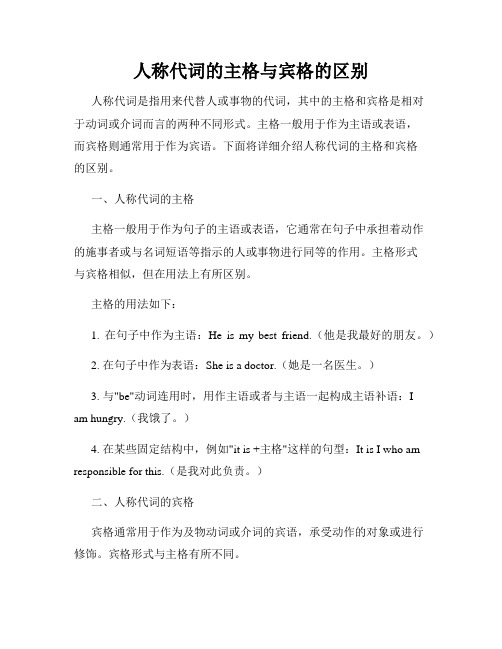
人称代词的主格与宾格的区别人称代词是指用来代替人或事物的代词,其中的主格和宾格是相对于动词或介词而言的两种不同形式。
主格一般用于作为主语或表语,而宾格则通常用于作为宾语。
下面将详细介绍人称代词的主格和宾格的区别。
一、人称代词的主格主格一般用于作为句子的主语或表语,它通常在句子中承担着动作的施事者或与名词短语等指示的人或事物进行同等的作用。
主格形式与宾格相似,但在用法上有所区别。
主格的用法如下:1. 在句子中作为主语:He is my best friend.(他是我最好的朋友。
)2. 在句子中作为表语:She is a doctor.(她是一名医生。
)3. 与"be"动词连用时,用作主语或者与主语一起构成主语补语:Iam hungry.(我饿了。
)4. 在某些固定结构中,例如"it is +主格"这样的句型:It is I who am responsible for this.(是我对此负责。
)二、人称代词的宾格宾格通常用于作为及物动词或介词的宾语,承受动作的对象或进行修饰。
宾格形式与主格有所不同。
宾格的用法如下:1. 在句子中作为直接宾语:I saw him yesterday.(我昨天看见了他。
)2. 在句子中作为间接宾语:He gave me a book.(他给了我一本书。
)3. 在介词后面作为介宾:This gift is for her.(这份礼物是给她的。
)4. 在某些固定结构中,例如"let + 宾格"这样的句型:Let me try.(让我试试。
)总结:人称代词的主格和宾格分别在不同的语法结构中发挥作用。
主格通常用作主语或表语,而宾格则常被用作直接宾语、间接宾语或介词的宾语。
它们在形式上有所不同,但在使用时要根据具体的上下文来确定。
在写英文文章时,正确使用人称代词的主格和宾格非常重要,因为错误的使用可能会导致句子意思不清或语法错误。
英语语法:代词的用法

英语语法:代词的用法代词是代替名词的词类。
大多数代词具有名词和形容词的功能。
英语中的代词,按其意义、特征及在句中的作用分为:人称代词、物主代词、指示代词、自身代词、相互代词、疑问代词、关系代词和不定代词八种。
下面就来跟着小编一起学习英语语法:代词的用法吧。
英语语法:代词的用法一、人称代词是表示"我"、"你"、"他"、"她"、"它"、"我们"、"你们"、"他们"的词。
人称代词有人称、数和格的变化,见下表:数单数复数格主格宾格主格宾格第一人称I me we us第二人称you you you you第三人称he him they them she her they them it it they them例如:Heis my friend. 他是我的朋友。
It's me. 是我。
二、物主代词是表示所有关系的代词,也可叫做代词所有格。
物主代词分形容性物主代词和名词性物主代词两种,其人物和数的变化见下表。
数单数复数人称第一人称第二人称第三人称第一人称第二人称第三人称形容词性物主代词my your his/her/its our your their名词性物主代词mine yourshis/hers/its ours yours theirs 例如:I like his car. 我喜欢他的小汽车。
Our school is here,and theirs is there. 我们的学校在这儿,他们的在那儿。
三、指示代词表示"那个"、"这个"、"这些"、"那些"等指示概念的代词。
指示代词有this,that,these,those等。
例如:That is a good idea. 那是个好主意。
高中英语语法系统讲解之二代词和数词

高中英语语法系统讲解之二代词和数词代词根据指代对象的不同,代词可分为人称代词、物主代词、反身代词、指示代词、不定代词、相互代词、疑问代词、连接代词和关系代词等。
一. 人称代词:有主格个宾格两种形式,它们也有单复数变化,具体情况如下:1. 人称代词的主格在句中作主语或表语。
如Tom waited a while but eventually he went home.Tom hoped the passenger would be Lily and indeed it was she.温馨提示:在复合句中,如果主句和从句主语相同,代词主语要用在从句中,名词主语用在主句中。
如When he arrived, Tom went straight to the bank.2. 人称代词的宾格在句子中作宾语或介词宾语,但在口语中也能作表语。
如I saw her with them, at least, Ithought it was her.(前一个her作宾语,them作介词宾语,后一个her作表语)3. 人称代词的指代问题○1不定代词anybody,everybody,nobody,anyone,someone,everyone,on one,及whoever和person 在正式场合使用时,可he,his,him代替。
如Nobody came, did he?○2动物名词的指代一般用it或they代替,有时也用he,she,带有亲切的感情色彩。
如Give the kitty some food. She is hungry.○3指代国家、船舶、车辆等的名词,含感情色彩时常用she。
如China will always do what she has promised to do.5. 并列人称代词的排列顺序○1单数人称代词并列作主语时,其顺序为:第二人称+ 第三人称+ 第一人称。
如You, he and I are of the same age.○2复数人称代词作主语时,其顺序为:第一人称+ 第二人称+ 第三人称。
人称代词练习题答案

人称代词练习题答案精品文档人称代词练习题答案人称代词指代人或物,在句中作主语或宾语,所以有主格和宾格。
宾格代词用于替代处于宾语位置上的名词,可以用作直接宾语和间接宾语。
例如:I am a student.Please help me.Give me a book.物主代词是表示所有关系的一种代词,亦称所有格代词。
物主代词有两种形式:形容词性物主代词和名词性物主代词。
形容词性物主代词为限定词,放在名词或名词短语前作定语。
如:This is my book.名词性物主代词起名词的作用,后面不可以再接名词。
在句子中可以作主语、宾语或表语。
如:1. Your pen is red. Mine is black.你的钢笔是红色的,我的是黑色的。
2. He didn’t use his ink. He used mine.他没有用他自己的墨水,他用了我的。
3. That book is hers, not yours.那本书是她的,不是你的。
英语代词练习题1 / 23精品文档I.选择填空1(. 女人名) is my friend. She has got long hair. _______hair is yellow. But_________ is black.3._________ dog is white .But_________ is black.4.--Whose computer is it ? Is it your father’s ? --No,it’s not________.It’s my mother’s. -- Oh, it’s__________.5. -- Look ! _________car is it ? Is it__________ ?-- No,_________ car is old .-- It’s_________ car .__________is new.II(用括号中单词的适当形式填空1(--Are these___________ pencils,--Yes ,theyare_________.2. –Whose pencil is this ?—It’s_________.3.She is__________ friend.照顾)_________ brother.5.—Are these_________ bags ,--No,they aren’t ________. They are______ . ’s . It is________.7.This isn’t_______ book . ________ is in the bag.III.填入正确的人称代词和物主代词2 / 23精品文档1(This isn’t_______knife. ________is green.2(These are your books, Kate. Put______in de desk,please. 3(______must look after _______things.4(Wei Fang, is that_______ruler ? Yes, it’s .5() a football . Give_______the green one. Please.6(It’s Lin Tao’s bag . Give it to________.7(Is this pencil-box Li L ei’s ? No,_______isvery new.8(很重). I can’t carry_____. Don’tworry ,Let_______ help_______.9. ______is a boy. ______name is 男人名). Mike’s friends 非常).10. My sister is in______room. _______is a teacher.11. Jane is a little girl . _____mother is a nurse.12. We are in______classroom. ______classroom is bag.13. My father and mother are teachers. ______are busy.14. You are a pupil. Is_______brother a pupil ,3 / 23精品文档too ?15. I ate all______sandwiches yesterday. Can I have one of_______.16. 男人名我也有一只). ______dog and_____had a fight.17. 男人名丢失了)_______ pen. Ask )19. Mr and Mrs. Greenand a friend of________are coming to see us.20. We are going to Paris to stay with a French friend of________.IV.根据汉语提示填空1(_______is a student. _______sister is a student too.2.________want_______ to do it today.3.________brother is a worker. ________are twins.4.________are English. ________are Chinese.5.All of________love______teacher.6.This is______book. That is_______.7.These pens are_______.______are over there.8.Can_____read it for_______.4 / 23精品文档V. 补全对话1(----Whose bike is it ? Is it______?----No,it’s not______. _______is red. But this bike is blue . ----Is it Jane’s ?----Sorry, I don’t know. Maybe it’s_______.----Jane,is this______bike ?----No,it’s not______.You can ask Bill. Maybe it’s________.----Bill,is this bike_______ ?----Oh,yes,it’s_______bike.Thank you very mnch!2. ----Whose classroom is it ? Is it_______classroom ?----No,it’s not________. It’s_________----__________ classroom is big.----Yes ,you are right.----But_______is small.VI.根据句意用适当人称代词、物主代词填空1(Mary works in a bookstore. ______likes_____work very mnch. 2(相同的) school. 一起).3(彼此、互相) two years ago.4(Her sister makes all______own dresses.5 / 23精品文档5(擅长于) English.6(----May I use_______bike ?----_______is broken.VII.根据汉语意思补全句子1(This is_______father. 这是我的爸爸。
主格人称代词的用法造句子
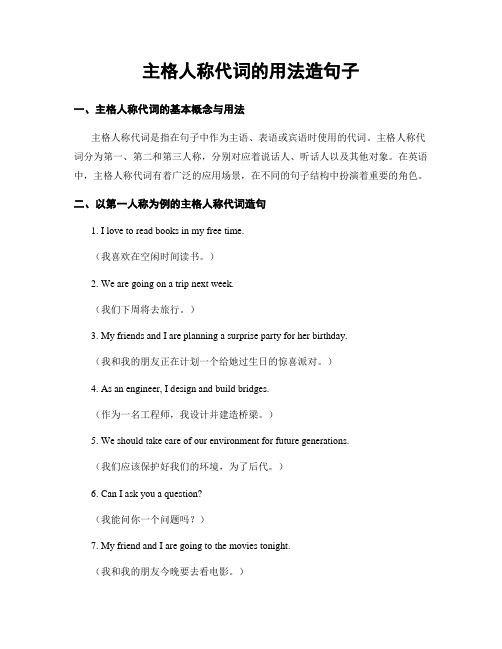
主格人称代词的用法造句子一、主格人称代词的基本概念与用法主格人称代词是指在句子中作为主语、表语或宾语时使用的代词。
主格人称代词分为第一、第二和第三人称,分别对应着说话人、听话人以及其他对象。
在英语中,主格人称代词有着广泛的应用场景,在不同的句子结构中扮演着重要的角色。
二、以第一人称为例的主格人称代词造句1. I love to read books in my free time.(我喜欢在空闲时间读书。
)2. We are going on a trip next week.(我们下周将去旅行。
)3. My friends and I are planning a surprise party for her birthday.(我和我的朋友正在计划一个给她过生日的惊喜派对。
)4. As an engineer, I design and build bridges.(作为一名工程师,我设计并建造桥梁。
)5. We should take care of our environment for future generations.(我们应该保护好我们的环境,为了后代。
)6. Can I ask you a question?(我能问你一个问题吗?)7. My friend and I are going to the movies tonight.(我和我的朋友今晚要去看电影。
)8. Let me show you how to use this new software.(让我来教你如何使用这款新软件。
)9. We are very excited about the upcoming concert.(我们对即将到来的音乐会感到非常兴奋。
)10. I want to learn how to play the piano.(我想学弹钢琴。
)三、以第二人称为例的主格人称代词造句1. You should take care of yourself and get enough rest.(你应该照顾好自己,保证充足的休息。
英语代词语法之人称代词3篇
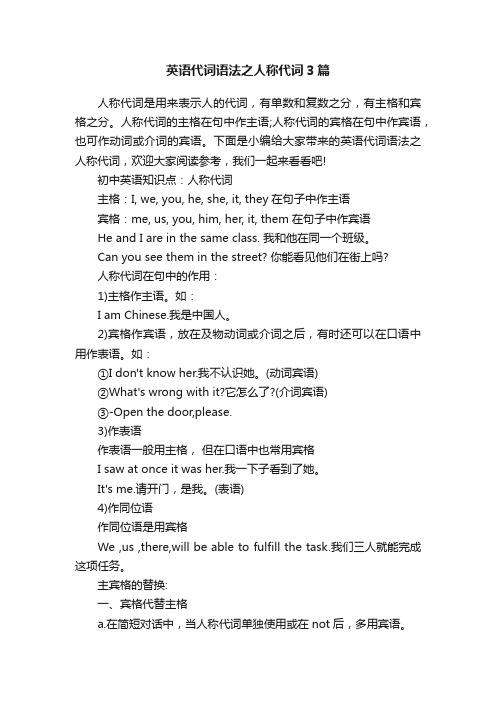
英语代词语法之人称代词3篇人称代词是用来表示人的代词,有单数和复数之分,有主格和宾格之分。
人称代词的主格在句中作主语;人称代词的宾格在句中作宾语,也可作动词或介词的宾语。
下面是小编给大家带来的英语代词语法之人称代词,欢迎大家阅读参考,我们一起来看看吧!初中英语知识点:人称代词主格:I, we, you, he, she, it, they在句子中作主语宾格:me, us, you, him, her, it, them在句子中作宾语He and I are in the same class. 我和他在同一个班级。
Can you see them in the street? 你能看见他们在街上吗?人称代词在句中的作用:1)主格作主语。
如:I am Chinese.我是中国人。
2)宾格作宾语,放在及物动词或介词之后,有时还可以在口语中用作表语。
如:①I don't know her.我不认识她。
(动词宾语)②What's wrong with it?它怎么了?(介词宾语)③-Open the door,please.3)作表语作表语一般用主格,但在口语中也常用宾格I saw at once it was her.我一下子看到了她。
It's me.请开门,是我。
(表语)4)作同位语作同位语是用宾格We ,us ,there,will be able to fulfill the task.我们三人就能完成这项任务。
主宾格的替换:一、宾格代替主格a.在简短对话中,当人称代词单独使用或在not后,多用宾语。
---- I like English. --我喜欢英语。
---- Me too. --我也喜欢。
---- Have more wine? --再来点酒喝吗?---- Not me. --我可不要了。
b.在表示比较的非正式的文体中,常用宾格代替主格。
但如果比较状语的谓语保留,则主语只能用主格。
人称代词的主格和宾格形式

人称代词的主格和宾格形式人称代词在英语中起着非常重要的作用,它们用于代替名词并在句子中扮演不同的角色。
在英语中,人称代词的主格和宾格形式有着不同的用法和变化规则。
本文将详细介绍人称代词的主格和宾格形式,以及它们在句子中的不同作用和用法。
一、主格形式人称代词的主格形式用于在句子中作为主语、表语或补语。
下面是一些常见的人称代词的主格形式:首先是第一人称单数代词"I",它表示的是说话者自己。
其次是第二人称单数代词"you",它用于称呼对方或指代听话的人。
第三人称单数代词"he"、"she"、"it"分别用于指代男性、女性和无生命的事物。
第一人称复数代词"we"用于包括说话者在内的多个人。
第二人称复数代词"you"表示多个人的称呼。
第三人称复数代词"they"用于指代多个人或事物。
这些主格形式的人称代词一般出现在句子的主语位置,例如:"I am a student."(我是学生。
)"You are my friend."(你是我的朋友。
)"He is a doctor."(他是一名医生。
)"She is a teacher."(她是一名教师。
)"It is a cat."(它是一只猫。
)"We are a team."(我们是一个团队。
)"They are students."(他们是学生。
)二、宾格形式人称代词的宾格形式用于在句子中作为动词的直接宾语、间接宾语或介词宾语。
下面是一些常见的人称代词的宾格形式:第一人称单数代词"me"代表说话者自己。
第二人称单数代词"you"用于称呼对方或指代听话的人。
人称代词的主格和宾格用法口诀
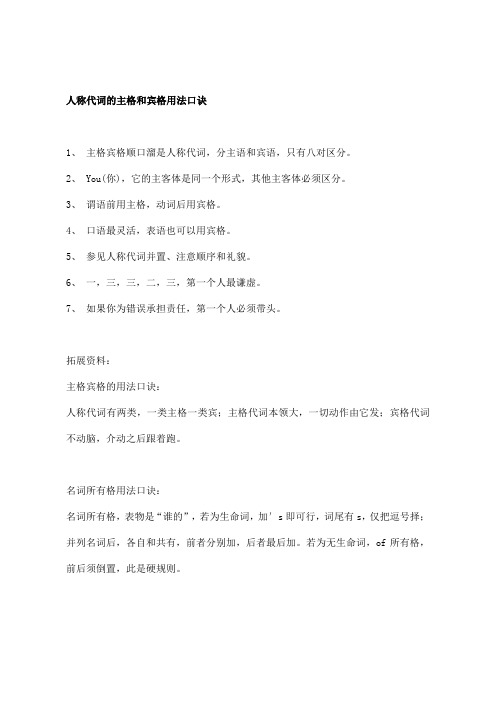
人称代词的主格和宾格用法口诀1、主格宾格顺口溜是人称代词,分主语和宾语,只有八对区分。
2、 You(你),它的主客体是同一个形式,其他主客体必须区分。
3、谓语前用主格,动词后用宾格。
4、口语最灵活,表语也可以用宾格。
5、参见人称代词并置、注意顺序和礼貌。
6、一,三,三,二,三,第一个人最谦虚。
7、如果你为错误承担责任,第一个人必须带头。
拓展资料:主格宾格的用法口诀:人称代词有两类,一类主格一类宾;主格代词本领大,一切动作由它发;宾格代词不动脑,介动之后跟着跑。
名词所有格用法口诀:名词所有格,表物是“谁的”,若为生命词,加′s即可行,词尾有s,仅把逗号择;并列名词后,各自和共有,前者分别加,后者最后加。
若为无生命词,of所有格,前后须倒置,此是硬规则。
主格用法:主格,宾格作句子的宾语或表语。
物主代词分为形容词性物主代词和名词性物主代词。
形容词性物主代词起形容词的作用,在句中作定语。
名词性物主代词起名词的作用,在句中作主语或宾语。
宾格用法:1、人称代词的主格作主语,宾格作动词的宾语和介词的宾语。
2、人称代词作表语时,一般用宾格,特别是在日常会话中。
3、人称代词处在动词之前,会影响选用主格还是用宾格。
例如:but和except既可作介词也可作连词,因此在but或except之后,用主格还是用宾格就要慎重。
所有格用法:1、-’s所有格的用法:-’s所有格通常用于有生命者,但有时也可用于无生命的东西,如用于表时间或距离的名词后,用于表示国家、城市、组织机构等的名词后等。
2、双重所有格。
双重所有格就是指同时既使用-’s所有格又使用of所有格。
4人称代词练习

When he arrived, John went straight to the bank. 约翰一到就直接去银行了。 2 人称代词的宾格在句子中作宾语或介词宾语, 但在口语中也能作主语补语,第一人称在省略句中,还可以作主语.
2.A: Which class is Julia in?
B: __S_h_e___ is in Class One, Junior Two.
3.A: Where does Wang Ping meet Julia?
B:__H__e___ meets _h_e__r__ at the school gate. 4.A: What do _y_o__u_r__ classmates do after school?
B: __T_h_e_y__ go to the English Corner.
5.A: What does John Smith do at the English Corner?
B: He talks with _h_i_s___ students in English and makes friends with __t_h_e_m__. 6.A: Do all the students like _t_h_e__ir__ school? B: Yes, _t_h_e_y_ do. _t_h_e_y_ all enjoy t_h_e__irschool life very much.
Fill in the blanks with the proper pronouns:
1. I want to see _h__im___ (他) off at the railway station.
第二讲 代词和数词

第二讲代词和数词一代词代词是代替名词以及起名词作用的短语,不定式,动词的-ing形式或句子的词。
注意:不同的人称合在一起使用时,一般的排序为:单数:you and I; you and he; he and I; you, he and I复数:we and you; we and they; you and they; we, you and they4. 疑问代词:what,which, who, whom, whose等5. 指示代词:是用来指代或标记人或事物的代词,具有指定的含义。
this;that; these; those6. 不定代词:不明确指代某个(某些)人,某个(些)事物的代词。
⑴some, any, many, much, a lot of 与lots of①many 修饰或代词可数名词的复数。
②much 修饰或代替不可数名词。
③a lot of和lots of既可以修饰可数名词,也可以修饰不可数名词。
④some和any 表示“一些”,即不确定的或未知的数量数目。
Some通常用于肯定句中,any 用于否定句,疑问句和条件句中。
Some可用在表示邀请或请求的疑问句中,强调希望对方给予肯定回答。
Would you like some apples?⑵other 与another 的用法①other 具有代词性质,既可指人,也可指物。
other表示“另外的”,“其他的”,the other 表示“两者中的另一个”,the others表示“其余的(指在一个范围内的其他全部)”,others 用于泛指,表示“其余的人或物”。
②another 具有代词性质,既可指人,也可指物,表示“另一个”(是泛指中的“另外一个”,并不是两者中的另一个)或“又一个”。
⑶each 与every 表示“每一”①each强调“个别”,可单独使用,也可修饰单数名词或跟of引导的介词短语;every修饰单数名词,强调“整体”,相当于汉语中的“每个都”。
人称代词主格与宾格的定义及区别
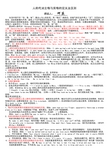
人称代词主格与宾格的定义及区别撰稿人:何庆生活中离不开“你、我、他”,表达人与人的关系,用“我们”很亲切;在客气的言语中用上“您”,又是多么的恰当。
这些有着替代作用,避免上下文中重复的词就是代词,它可以起着名词的作用。
正是由于有了代词的运用,才使我们的语言显得更加亲切,使我们的关系更加融洽,不过,英语世界里代词主、宾有别,位置也稍有差异。
下面就让我们一起来学习一下代词,好好研究研究“你、我、他”吧!英语的人称代词(Personal Pronoun)有三种不同的人称形式:第一人称(First Person)指说话人自己;第二人称(Second Person)指说话的对象;第三人称(Third Person)指说话人谈论的对象。
三种人称又各有单、复数形式,第三人称单数还有阳性、阴性、中性的区别。
这样,人称代词就具有下列诸种形式:在上列人称代词的不同形式中,还包含了主格(Subjective Case)、宾格(Objective Case)两种“格”的形式。
这样,从“格”的形式来划分,英语的人称代词又可归纳为:主格:I,you,he,she,it,we,you,they 宾格:me,you,him,her,it,us,you,them此外,还有所有格形式。
属格:my,mine,your,yours,his,her,hers,its,our,ours,their,theirs 属格又可分为两类:一类是形容词性物主代词(my,your,his,her,its,our,their)即本书所讲的“物主限定词”;另一类是名词性物主代词(mine,yours,his,hers,ours,theirs),即本书中的“物主代词”。
人称代词用法:1)人称代词的主格在句子中作主语或主语补语,例如:①.John waited a while but eventually he went home.约翰等了一会儿,最后他回家了。
英语基础语法:代词重要知识点总结
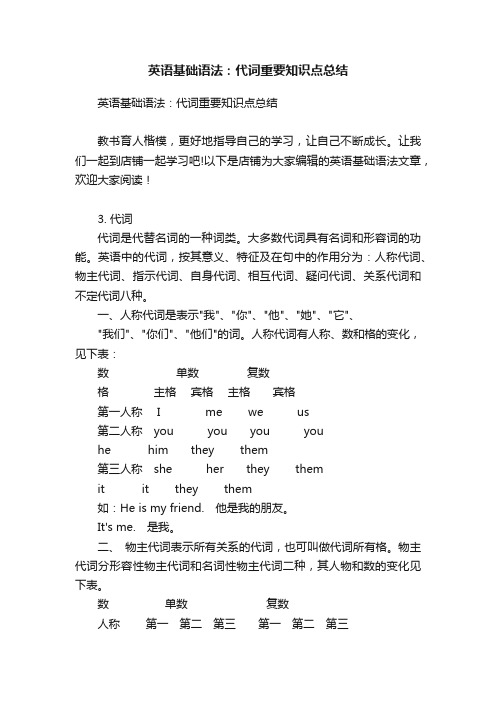
英语基础语法:代词重要知识点总结英语基础语法:代词重要知识点总结教书育人楷模,更好地指导自己的学习,让自己不断成长。
让我们一起到店铺一起学习吧!以下是店铺为大家编辑的英语基础语法文章,欢迎大家阅读!3. 代词代词是代替名词的一种词类。
大多数代词具有名词和形容词的功能。
英语中的代词,按其意义、特征及在句中的作用分为:人称代词、物主代词、指示代词、自身代词、相互代词、疑问代词、关系代词和不定代词八种。
一、人称代词是表示"我"、"你"、"他"、"她"、"它"、"我们"、"你们"、"他们"的词。
人称代词有人称、数和格的变化,见下表:数单数复数格主格宾格主格宾格第一人称 I me we us第二人称you you you youhe him they them第三人称she her they themit it they them如:He is my friend. 他是我的朋友。
It's me. 是我。
二、物主代词表示所有关系的代词,也可叫做代词所有格。
物主代词分形容性物主代词和名词性物主代词二种,其人物和数的变化见下表。
数单数复数人称第一第二第三第一第二第三人称人称人称人称人称人称形容词性my your his/her its our your/their物主代词名词性 mine yours his/hers its ours yours/theirs物主代词如: I like his car.我喜欢他的小汽车。
Our school is here,and theirs is there.我们的学校在这儿,他们的在那儿。
三、指示代词表示"那个"、"这个"、"这些"、"那些"等指示概念的代词。
英语人称代词

考点名称:人称代词人称代词:人称代词是用来表示人的代词,有单数和复数之分,有主格和宾格之分。
人称代词的主格在句中作主语;人称代词的宾格在句中作宾语,也可作动词或介词的宾语。
主格:I, we, you, he, she, it, they在句子中作主语宾格:me, us, you, him, her, it, them在句子中作宾语He and I are in the same class. 我和他在同一个班级。
Can you see them in the street? 你能看见他们在街上吗?人称代词在句中的作用:1)主格作主语。
如:I am Chinese.我是中国人。
2)宾格作宾语,放在及物动词或介词之后,有时还可以在口语中用作表语。
如:①I don't know her.我不认识她。
(动词宾语)②What's wrong with it?它怎么了?(介词宾语)③-Open the door,please.3)作表语作表语一般用主格,但在口语中也常用宾格I saw at once it was her.我一下子看到了她。
It's me.请开门,是我。
(表语)4)作同位语作同位语是用宾格We ,us ,there,will be able to fulfill the task.我们三人就能完成这项任务。
主宾格的替换:一、宾格代替主格a.在简短对话中,当人称代词单独使用或在not后,多用宾语。
---- I like English. --我喜欢英语。
---- Me too. --我也喜欢。
---- Have more wine? --再来点酒喝吗?---- Not me. --我可不要了。
b.在表示比较的非正式的文体中,常用宾格代替主格。
但如果比较状语的谓语保留,则主语只能用主格。
He is taller than I/me.He is taller than I am.二、主格代替宾格a.在介词but,except后,有时可用主格代替宾格。
- 1、下载文档前请自行甄别文档内容的完整性,平台不提供额外的编辑、内容补充、找答案等附加服务。
- 2、"仅部分预览"的文档,不可在线预览部分如存在完整性等问题,可反馈申请退款(可完整预览的文档不适用该条件!)。
- 3、如文档侵犯您的权益,请联系客服反馈,我们会尽快为您处理(人工客服工作时间:9:00-18:30)。
人称代词的主格在句子中作主语或表语,宾格作动词或介词的宾语,也可作表语使用。
如:We all like him.(we作主语,him作宾语)—Who is it?—It's I/me.(it作主语,I/me作表语) 当句中三种人称单数并列时一般顺序是you, he and I(即二、三、一);复数并列时顺序是we, you and they。
(2)it的用法①代替前面提到过的事物。
如:This is a watch. It is new.这是一块手表,它是新的。
②指时间、天气、距离等。
如:—How's the weather today?今天天气怎样?—It's sunny.天气晴朗。
It's eight o'clock in the evening. 现在是晚上8点钟。
代替动词不定式作句中的形式主语或形式宾语,也可用于某些固定句式中。
如:____hard for me________the homework on time.对我而言,按时完成作业有困难。
We think it helpful________a walk after supper.我们认为晚饭后散步很有益。
________him three days to finish reading the book.他花了三天时间读完了那本书。
形容词性物主代词不能单独使用,用于名词前作定语,相当于形容词的作用;名词性物主代词单独使用,相当于名词的作用。
名词性物主代词=形容词性物主代词+名词。
如:This is his computer. =This computer is his.2.用法(1)反身代词在句子中用作宾语和表语(不能单独用作主语),和句子中的主语相呼应,表示主语动作的承受者或表现的特征是自己本身。
如:The girl is too young to look after ______.这个女孩太小,不能照顾自己。
(作宾语)(2)反身代词作主语或宾语的同位语,起强调主语或宾语的作用。
如:I myself can do this work well.我自己能做好这项工作。
(作主语的同位语)You can ask the teacher herself.你可以问问老师本人。
(作宾语的同位语)固定搭配leave one by oneself 把某人单独留下______________ 随便吃/喝by oneself 单独地______________ 过得快乐;玩得开心learn by oneself=teach oneself 自学______________ 伤害某人自己come to oneself 苏醒say to oneself 心里想;自言自语make oneself at home 别拘束1.this/that可用于电话用语中,this代表自己,that则代表对方。
如:Hello! This is Jane.喂!我是简。
Is that Mike?你是迈克吗?Who is that?你是谁?2.it, one, that的用法区别为了避免重复,可以用it, one, that代替上文出现的名词。
注意以下几点:(1)it用来指上文提及的同一个事物或前面提及的情况。
it可代替单数可数名词或不可数名词。
如:She enjoyed the story because it is very interesting.她喜欢这个故事,因为很有趣。
The food is delicious. I like it very much.这食物很可口,我很喜欢。
(2)one用以避免重复单数可数名词。
它既可代替事物,泛指同类事物中的一个,也可以代替人,其复数形式为ones。
My sweater is very old. I'll buy a new one.我的毛衣旧了,我要买件新的。
The green pencils are yours and the red ones are mine.绿色铅笔是你的,红色铅笔是我的。
(3)that用来代替物,不能代替人,它既可以代替可数名词,也可以代替不可数名词,其复数形式为those。
如:The population of the city is much larger than that of the town.这个城市的人口比那个镇的人口多很多。
The apples in the box are different from those on the table.盒子里的苹果与桌上的苹果不同。
1.定义不指明代替任何特定名词或形容词的代词叫做不定代词。
不定代词大都可以代替名词和形容词。
多数可以作主语、宾语、表语或定语。
常见的不定代词有:some, any, no, none, one, all, every, each, other, another, either, neither, both, many, much, (a)few, (a)little, a lot of, lots of以及some, any, no, every与thing, body或one构成的复合不定代词。
2.常用的意义相近的不定代词之间的辨析He has ____________ friends,but he has ____________ good friends.他有一些朋友,但是他几乎没有好朋友。
There's still ____________ meat at home,but there's ____________ bread. 家里还有点肉,但是几乎没面包了。
(2)some与any①二者均表示“一些”,既可以修饰可数名词,也可以修饰不可数名词。
some一般用于肯定句,any一般用于疑问句、否定句和条件状语从句。
②在疑问句中,表示说话人希望得到肯定回答或表示请求、建议时用some。
如:Would you like __________?来点儿茶吗?Will you please get ______________ for me? 请你帮我弄点儿水好吗?There are some trees on ________ side of the road. 马路两边都有树。
I like ________ of these two coats. 两件大衣我都不喜欢。
4)many, much与a lot of三者都表示“许多”。
其中many 和much 常用于否定句和疑问句中;肯定句中常用a lot of 。
many修饰可数名词复数;much修饰不可数名词;a lot of(=lots of)既可以修饰可数名词复数,又可以修饰不可数名词。
(5)each与every两者都表示“每个,各个”,each强调每个人或事物的个别情况,即强调个体;every有“全体”的意思,即强调整体。
如:________ of them has a dictionary.他们每人有一本词典。
__________ minute is important to us.对我们来说每分钟都很重要。
6)another,(the)other与(the)othersother泛指“另外的”,不能单独使用,后接名词。
others等于“other+复数名词”,泛指“别的人或物”;the other(+单数可数名词)指“两者中的另一个”,常用于“one…the other…”结构。
the others等于“the other+复数名词”,表示“其余所有的人或物”。
another 泛指“三者或三者以上中的另一个”。
如:Do you have any other ideas? 你有别的想法吗?I have two brothers.__________ is a doctor,__________ is a teacher. 我有两个兄弟。
一个是医生,另一个是教师。
He is always ready to help __________.他总是乐意帮助别人。
Five of them are in the classroom.What about _________?他们中有五个人在教室里。
其余的人呢?Don't lose heart. Have __________ try. 别灰心,再试一次。
(7)复合不定代词指代人的有:someone/somebody(某人), anyone/anybody(任何人), nobody(没人), everyone/everybody(每个人)。
指代事物的有:something(某事,某物), anything(任何事), nothing(没什么),everything(每件事,一切)。
请注意以下几点:①以some和any开头的复合不定代词的用法和some, any的用法一样。
(some和any的用法见上文)②修饰复合不定代词的形容词要放在其后。
如:Is there ____________________ in today's newspaper?今天的报纸有什么重要新闻吗?③复合不定代词作主语视为单数。
如:Nobody __________ his name. 没有人知道他的名字。
疑问代词主要有who(谁), whom(谁), which(哪一个/哪一些),what(什么)和whose(谁的),用来构成特殊疑问句,放在句子开头。
如:______ do you want to know? 你想要知道什么?______ shirt is this? 这是谁的衬衫?用所给词的适当形式填空1.Ms Li teaches ________ (we) math this term.2.This isn't ________ (she) watch. She lost hers.3.My schoolbag is the same as ________ (you).4.They enjoyed ____________ (they) at the party.5.________ (that) blue socks look very nice.6.Everyone in our class ________ (study) hard every day.7.He doesn't have ________ (something) to do.8.________ (whom) spoke at the meeting?9.Help ________ (yourself) to some beef, Jack.10.Shall we wait for ________ (they) at the school gate?11.________(we)teachers are very friendly to us.12.Bob is a friend of ________ ( I ). We often help each other.13.That's my father. ________ (him) is reading anewspaper.14.She cooked dinner by ________ (she).15.My school is bigger than ________ (her).16.I think the bike can't be ________ ( he).17.Jane is sitting between Lily and ________ (my).18.Their books are older than ________ (we).19.Please take some cards to ________ (she).20.Don't make ________ (his) feel sad.21.________ (us) should be polite to the old.22.My sister has a cat. ________ (it) name is Mimi.23.The little boy can't dress ________ (him).24.Does ________(somebody) have anything more to say?。
